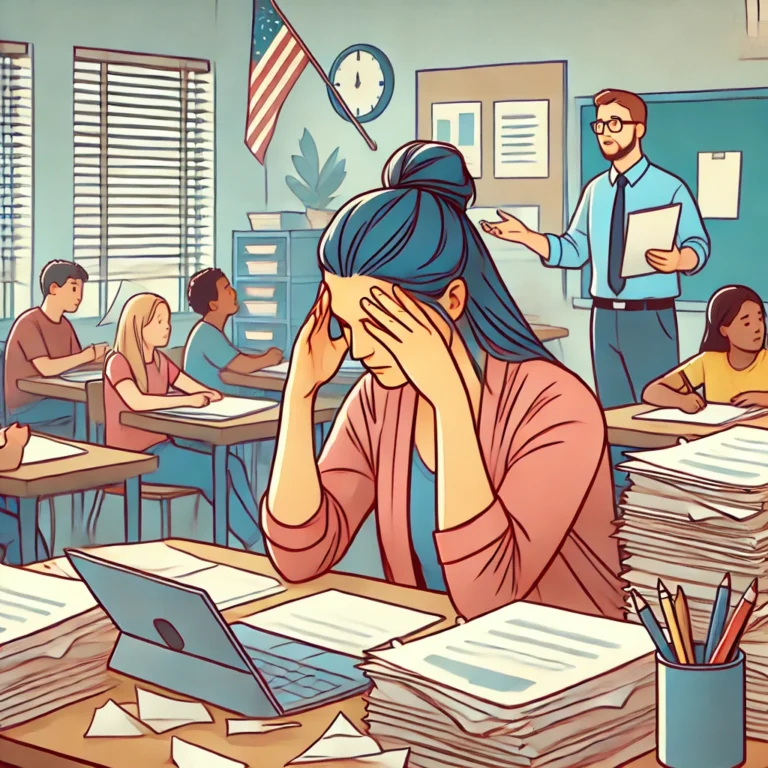As a teacher in the U.S. education system, my days are filled with moments of joy, fulfillment, and the unique satisfaction that comes from seeing a student grasp a concept or overcome a challenge. Yet, behind the rewarding aspects of this profession lie struggles that many outside of the education field don’t often see or fully understand. Teaching has become a balancing act of managing the needs of students, the expectations of administration, and the overwhelming pressures of an underfunded and often underappreciated system. Here, I want to share some of the most difficult challenges I face daily as a teacher, and how they impact both my professional and personal life.
1. Burnout and Emotional Exhaustion
One of the most pervasive challenges I encounter is burnout. This is not just about feeling tired at the end of a long school day; it’s a deep emotional exhaustion that builds over time. Teaching is an inherently emotional job. I am not just an educator; I am a counselor, a mediator, a caregiver, and sometimes even a surrogate parent. The emotional weight of supporting students through their academic and personal struggles is enormous.
For example, I have students who face poverty, unstable home environments, and mental health issues. Every day, I try to meet not only their educational needs but also to offer emotional support. But it’s draining. There are nights when I go home and can’t stop thinking about a particular student or a difficult situation, knowing that I am doing everything I can but often feeling like it’s never enough.
2. Underfunding and Lack of Resources
The reality of teaching in many public schools in the U.S. is that we are often expected to do more with less. Classrooms are overcrowded, textbooks are outdated, and basic supplies are scarce. Most people would be surprised at how much of my own money I spend on supplies to ensure that my students have what they need to succeed. Whether it’s buying art supplies, pens, or snacks for students who come to school hungry, these costs add up.
Additionally, the lack of funding impacts the resources available for professional development and classroom innovation. I want to integrate more technology and creative learning tools into my teaching, but there simply isn’t enough financial support for that. It’s disheartening to know that while my students are capable of achieving great things, the lack of proper resources often holds them back.
3. The Pressure of Standardized Testing
Standardized testing is another major challenge that overshadows much of the work I do in the classroom. The constant pressure to meet testing benchmarks turns education into a numbers game, where the focus shifts from real learning to teaching for the test.
Many of my students don’t test well because of various factors: anxiety, language barriers, or simply a lack of interest in the format of the tests. Yet, their performance on these standardized tests often determines not just their future but also my effectiveness as a teacher. The pressure to “teach to the test” means that I sometimes have to sacrifice creativity, exploration, and meaningful learning opportunities in favor of drilling test-taking strategies.
4. Workload and Time Management
The workload for teachers extends far beyond the classroom. I spend hours each week grading papers, preparing lesson plans, communicating with parents, and attending meetings. While it’s easy to think that the school day ends when the bell rings, my workday often stretches late into the evening. There are also extracurricular activities, professional development workshops, and endless documentation that must be completed for administrative purposes.
One of the biggest challenges is simply finding time for myself. Teaching is not a job that you can easily leave behind at the end of the day. I’m constantly thinking about how I can help certain students, how to improve a lesson, or how to manage classroom behavior. The mental load is heavy, and finding a work-life balance is something that many teachers struggle with. Often, I feel guilty when I take time for myself because there’s always more that could be done for my students.
5. Lack of Support and Respect
Another difficult aspect of teaching is the lack of respect and support that we sometimes face. There is a prevailing misconception that teaching is an easy job with summers off and short workdays. But in reality, teachers are under immense pressure, and we often don’t receive the professional respect we deserve. This lack of respect extends to how society views our profession and how policymakers make decisions that directly affect us without truly understanding the classroom experience.
Support from administrators can also be lacking. I’ve had situations where I’ve brought up concerns about classroom sizes, behavior issues, or the need for more resources, only to feel like my voice wasn’t heard. It’s frustrating to feel unsupported in a profession that requires so much emotional and physical energy.
6. Student Behavior and Classroom Management
Classroom management is an ongoing struggle. Students today face more distractions than ever, from social media to mental health challenges. Managing behavior in the classroom requires a fine balance between discipline and empathy.
For example, I had a student who consistently disrupted class. It was easy to see him as a “problem child,” but when I learned about the difficulties he faced at home, it became clear that his behavior was a cry for help. While I work hard to create a safe and nurturing environment, it’s difficult when behavior issues consume so much of the limited class time. And with large class sizes, it’s nearly impossible to give each student the individual attention they need.
Why We Keep Going
Despite all these challenges, I—and many of my colleagues—continue to teach because of the profound belief in the impact we have on students’ lives. Every small victory, every “aha” moment in the classroom, reminds me why I chose this path. Teaching is not just a job; it’s a calling.
However, we need support. We need better resources, more reasonable workloads, and a shift in how society views education and educators. Teaching is at the heart of a functioning society, and the struggles we face should not be ignored. If we want our students to thrive, we must first ensure that our teachers are supported, respected, and valued.


